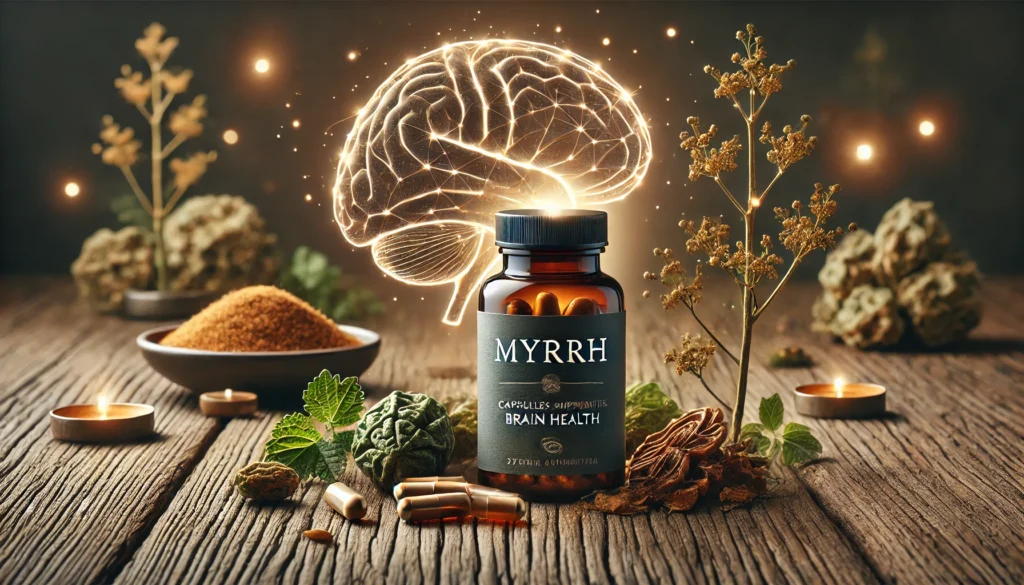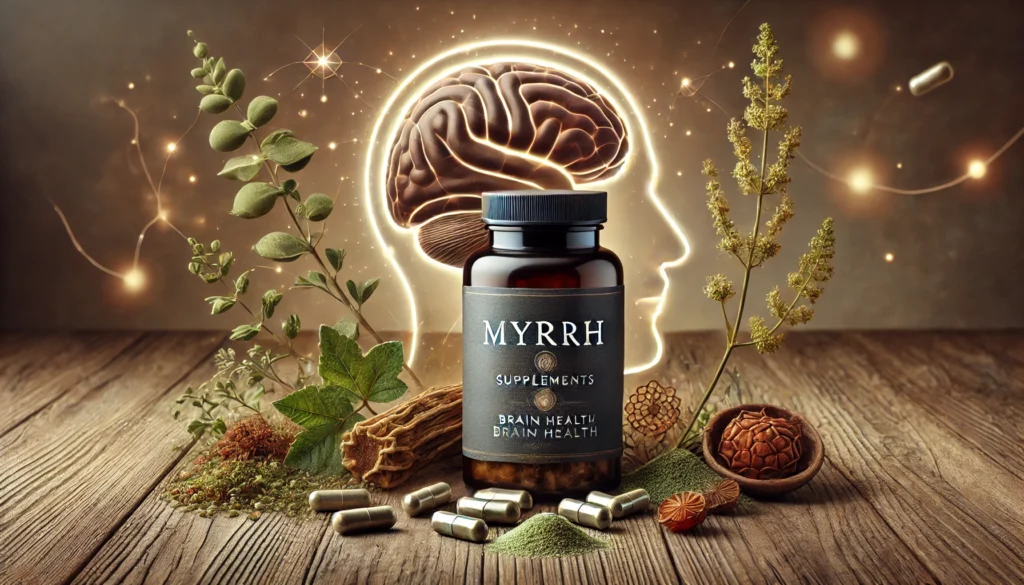Myrrh, a resin obtained from the Commiphora species of trees, has been revered for centuries for its medicinal and aromatic properties. Used in traditional medicine, religious rituals, and perfumery, myrrh is also gaining recognition for its potential as a nootropic supplement. This article provides an in-depth exploration of myrrh, examining its source, chemical properties, mechanisms of action, potential nootropic benefits, appropriate dosages, side effects, interactions with other supplements and medications, and the safety considerations for its use.
You May Also Like:
Myrrh: Potential Nootropic Benefits, Dosage, Side Effects, Interactions, and Other Important Information About This Supplement is an original (NootropicsPlanet) article.
Sources of Myrrh
Myrrh is derived from the resin of various species within the Commiphora genus, most notably Commiphora wightii and Commiphora africana. These trees are primarily found in the Middle East and parts of Africa. Myrrh has been historically utilized for its therapeutic and aromatic qualities, especially in ancient Egypt and in traditional Chinese and Ayurvedic medicine. The resin is harvested by making incisions in the bark of the tree, from which the sticky substance oozes and hardens into resinous droplets. The resin is then collected, dried, and processed into powder, tinctures, or oils.
The active compounds in myrrh include sesquiterpenes, diterpenes, and essential oils, particularly curzerene, germacrene, and eugenol. These compounds are believed to possess a wide range of pharmacological activities, including anti-inflammatory, antimicrobial, and antioxidant effects. As a nootropic, myrrh’s bioactive components may also have neuroprotective properties and cognitive-enhancing effects.

Chemistry of Myrrh
The chemical composition of myrrh resin varies depending on its source, but it primarily consists of essential oils, terpenoids, and polysaccharides. Myrrh contains about 20-25% essential oils, with sesquiterpenes (such as curzerene) being the most abundant class of compounds. These molecules are known to have anti-inflammatory, analgesic, and neuroprotective effects, which are key for its potential benefits as a nootropic.
- Sesquiterpenes: Compounds like curzerene have demonstrated significant antioxidant and anti-inflammatory properties, which are thought to help reduce oxidative stress and inflammation in the brain, both of which contribute to cognitive decline.
- Diterpenes: Myrrh also contains diterpenes, which exhibit neuroprotective properties by protecting neurons from damage induced by oxidative stress. These compounds can modulate the brain’s neurotransmitter systems and may support mental clarity and focus.
- Eugenol: This compound, found in trace amounts in myrrh, is known for its analgesic and anti-inflammatory properties and may contribute to a reduction in stress and anxiety, supporting cognitive performance.
The essential oils of myrrh also have mood-lifting and calming effects, contributing to its use in reducing stress and promoting mental well-being. Its interaction with the body’s serotonin and dopamine systems suggests a potential role in mood regulation, which can indirectly enhance cognitive performance.
Physiological Mechanisms of Myrrh in the Body and Brain
Myrrh’s effects on the body and brain are thought to be primarily due to its antioxidant, anti-inflammatory, and neuroprotective properties. The resin’s active compounds may influence several physiological mechanisms that are important for maintaining brain health and cognitive function.
- Anti-inflammatory Effects: Chronic inflammation is a key factor in many neurodegenerative diseases, including Alzheimer’s and Parkinson’s disease. Myrrh’s terpenoids, particularly sesquiterpenes, have been shown to inhibit the activity of pro-inflammatory cytokines and reduce oxidative stress. By modulating inflammatory pathways, myrrh may help protect the brain from damage caused by inflammation, a factor often associated with cognitive decline.
- Neuroprotective Properties: The antioxidant activity of myrrh’s terpenoids can protect neurons from oxidative stress. Free radicals can damage cells, including those in the brain, leading to cognitive deficits and increasing the risk of neurodegenerative conditions. Myrrh’s ability to scavenge free radicals may contribute to its neuroprotective effects, offering potential benefits in combating conditions like Alzheimer’s and age-related cognitive decline.
- Mood and Stress Regulation: Myrrh’s essential oils, particularly eugenol, are believed to have mild sedative and anxiolytic (anxiety-reducing) effects. By promoting relaxation and reducing stress, myrrh may help improve mental clarity and focus, which is crucial for cognitive performance. Chronic stress is a major cognitive disruptor, and managing stress effectively may support optimal brain function.
- Neurotransmitter Modulation: While research on myrrh’s direct effects on neurotransmitters is limited, there is some evidence suggesting that its compounds, particularly eugenol and sesquiterpenes, may modulate the levels of neurotransmitters such as serotonin, dopamine, and GABA (gamma-aminobutyric acid). These neurotransmitters play vital roles in mood regulation, mental clarity, and cognitive functions like memory and focus.

Nootropic Benefits of Myrrh
Myrrh’s neuroprotective and mood-enhancing properties make it an interesting candidate for cognitive enhancement. Though more research is needed to establish it as a proven nootropic, there are several mechanisms through which myrrh may support cognitive function:
- Enhanced Focus and Mental Clarity: Myrrh’s ability to reduce oxidative stress and inflammation in the brain may help enhance focus, memory, and learning ability. By promoting a healthier brain environment, myrrh may support mental clarity, particularly in individuals who experience cognitive fog due to stress or aging.
- Neuroprotection and Age-Related Cognitive Decline: The antioxidant and anti-inflammatory properties of myrrh may help protect against neurodegenerative diseases like Alzheimer’s, Parkinson’s, and other forms of dementia. By mitigating the damage caused by free radicals and inflammation, myrrh could help slow the progression of age-related cognitive decline.
- Mood Enhancement and Cognitive Function: Myrrh’s mild sedative and anxiolytic effects may improve overall mood and reduce stress, which is important for cognitive performance. Chronic stress impairs memory, learning, and concentration, and by reducing stress, myrrh may indirectly boost cognitive abilities.
- Anti-anxiety and Relaxation: As a natural anxiolytic, myrrh may help alleviate symptoms of anxiety, which can contribute to cognitive impairment. Its calming effects may make it easier for individuals to focus, thereby improving productivity and mental performance.

Dosage and Supplementation Guidelines
There are currently no established recommended daily allowances (RDAs) for myrrh as a supplement. The dosage typically depends on the form of myrrh being used (e.g., resin, extract, or oil), as well as the specific goals of supplementation.
- Standard Dosage: For general supplementation, myrrh extract is typically taken in doses ranging from 300 to 500 mg per day. This is often taken in capsule or tablet form and may vary depending on the concentration of active compounds in the extract.
- Dosage for Cognitive Enhancement: When used as a nootropic, myrrh may be taken in slightly higher doses, generally between 500 mg and 1 gram per day, depending on the individual’s tolerance and health status. It is essential to consult a healthcare provider before using higher doses, particularly in combination with other supplements.
- Myrrh Oil: When using myrrh essential oil, a few drops (1-3) can be diluted in a carrier oil and applied topically or used in aromatherapy. This method is often used for stress reduction or mood enhancement.
It is important to note that myrrh supplements should be taken under the supervision of a healthcare provider, especially for those with underlying health conditions.
Side Effects and Safety
Myrrh is generally considered safe when used in moderation, but it may cause side effects in some individuals, particularly at high doses. Possible side effects include:
- Gastrointestinal Discomfort: Some individuals may experience mild stomach upset, nausea, or diarrhea when taking myrrh supplements in high doses.
- Skin Irritation: When applied topically, myrrh essential oil may cause irritation or allergic reactions in sensitive individuals.
- Hypoglycemia: Myrrh has been shown to have mild hypoglycemic effects, which could lower blood sugar levels. Individuals with diabetes or those taking medications to manage blood sugar should consult a healthcare provider before using myrrh.
- Pregnancy and Breastfeeding: There is limited research on the safety of myrrh during pregnancy and breastfeeding. It is generally recommended to avoid its use during these periods unless advised by a healthcare provider.

Interactions with Other Supplements and Medications
Myrrh may interact with several medications and supplements, which could potentially affect its safety and efficacy. Notable interactions include:
- Blood Thinners: Myrrh has mild anticoagulant effects, so it may interact with blood-thinning medications like warfarin, increasing the risk of bleeding. Individuals on anticoagulants should consult a healthcare provider before using myrrh.
- Diabetes Medications: Myrrh’s potential hypoglycemic effects may enhance the action of diabetes medications, leading to excessively low blood sugar. Blood sugar levels should be monitored closely when using myrrh in combination with antidiabetic drugs.
- Antidepressants: Myrrh’s potential effects on serotonin and dopamine may interact with antidepressant medications, especially selective serotonin reuptake inhibitors (SSRIs) or monoamine oxidase inhibitors (MAOIs), potentially leading to serotonin syndrome.
Risks for Individuals with Certain Health Conditions
Individuals with certain health conditions should exercise caution when using myrrh. These include:
- Liver Disease: Myrrh is metabolized in the liver, so individuals with liver disease should use myrrh cautiously or avoid it unless under medical supervision.
- Pregnancy and Breastfeeding: As mentioned, the safety of myrrh during pregnancy and breastfeeding has not been well-studied, and it should only be used under the guidance of a healthcare professional during these times.
Conclusion: Should You Consider Myrrh as a Nootropic?
Myrrh’s potential as a nootropic is primarily attributed to its neuroprotective, anti-inflammatory, and mood-enhancing properties. While it may not be the most well-established nootropic supplement, its ability to improve mental clarity, reduce stress, and protect against cognitive decline makes it an intriguing option for cognitive support. As with any supplement, it is crucial to use myrrh responsibly, beginning with lower doses and consulting a healthcare provider, particularly for individuals with pre-existing health conditions or those taking medications that could interact with the resin.

References:
- Health benefits and risks of myrrh. Retrieved from: https://www.medicalnewstoday.com/articles/267107
- The Role of Myrrh Metabolites in Cancer, Inflammation, and Wound Healing: Prospects for a Multi-Targeted Drug Therapy. Retrieved from: https://pmc.ncbi.nlm.nih.gov/articles/PMC9416713/
- Myrrh – Uses, Side Effects, and More. Retrieved from: https://www.webmd.com/vitamins/ai/ingredientmono-570/myrrh
- 11 Surprising Benefits and Uses of Myrrh Oil. Retrieved from: https://www.healthline.com/nutrition/myrrh-oil
- Myrrh Oil: Are There Health Benefits? Retrieved from: https://www.webmd.com/diet/myrrh-oil-health-benefits
Important Note: The information contained in this article is for general informational purposes only, and should not be construed as health or medical advice, nor is it intended to diagnose, prevent, treat, or cure any disease or health condition. Before embarking on any diet, fitness regimen, or program of nutritional supplementation, it is advisable to consult your healthcare professional in order to determine its safety and probable efficacy in terms of your individual state of health.
Regarding Nutritional Supplements Or Other Non-Prescription Health Products: If any nutritional supplements or other non-prescription health products are mentioned in the foregoing article, any claims or statements made about them have not been evaluated by the U.S. Food and Drug Administration, and such nutritional supplements or other health products are not intended to diagnose, treat, cure, or prevent any disease.


